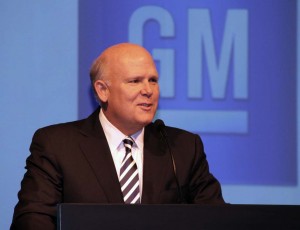General Motors and PSA Peugeot Citroen have confirmed they have begun discussing “possible cooperations and alliances.”
Both makers cautioned that their talks are still too early to discuss in detail, though industry sources are indicating that the U.S. maker, the world’s largest, and French-based PSA, Europe’s second-largest automaker by sales, are focusing on a manufacturing alliance – though some sort of joint product development could be in the cards, as well, other sources suggested.
Such a move could be critical for GM, which is struggling to staunch ongoing losses at its German-based Opel subsidiary. Despite hopes that its European operations would be back in the black, GM suffered a $700 million loss in 2011, raising concerns about the company’s prospects despite a record global profit of $7.6 billion for the year.
Peugeot has its own problems, however, and exactly a week ago announced plans for new cost cuts and the sale of a logistics unit that could help finance its push to expand globally.
GM issued a statement noting, “We routinely talk to others in the industry,” but not formally confirming the talks. (But GM sources did indicate they’re “ongoing.”)
For its part, Paris-based PSA stressed that, “There can be no certainty at this stage that these discussions will result in any agreement.”
Their caution should come as no surprise. Both makers have been burned before. Talks between PSA and Mitsubishi reached an advanced stage before collapsing in 2010.
General Motors, meanwhile, failed to reach an agreement several years back, with Peugeot’s French-Japanese rival, the Renault-Nissan Alliance. The American maker also saw a number of other alliances and partnerships collapse in the years leading up to its 2009 bankruptcy, including those with Japanese makers Fuji – parent of Subaru – Suzuki and Isuzu, as well as a once-promising alliance with Fiat. It cost GM $2 billion to exit the partnership with the Italian maker.
But both GM and PSA clearly recognize that the auto industry makes for strange bedfellows and alliances have become an increasingly popular way of navigating through the increasingly competitive market. After failing to negotiate a deal with GM, the Renault-Nissan Alliance announced a partnership with Daimler AG, in 2010. That has since expanded significantly to include both manufacturing and product development efforts.
Word of the talks between GM and PSA surfaced when the French company announced that, “in the framework of its strategy of globalization and performance improvement, PSA Peugeot Citroen is examining cooperation and alliances.” That was later revealed to involve the U.S. maker.
“This is likely to involve a cooperative venture, not a share exchange,” said Joe Phillippi, chief analyst with AutoTrends Consulting. But while limited in scope, it could still yield “tremendous benefits,” he suggested, helping the two potential partners reduce expenditures on modern manufacturing operations.
One area of possible cooperation, Phillippi and others suggested, would involve commercial vehicles, most likely vans – which constitute one of the larger segments of the European market, totaling about 2 million units annually. Peugeot might need help there after an existing joint venture with Fiat ends in 2017.
(Ford to unveil new Tourneo Custom Concept van in Geneva, offering a hint of the new U.S. Transit van. Click Here for more.)
GM, meanwhile, has been struggling to cut manufacturing costs, especially in Germany. But Phillippi cautioned that making any significant changes to the existing Opel production system “won’t be easy” because of union agreements and German laws.
In a note to investors, Credit Suisse auto analyst Erich Hauser sounded his own note of caution, advising, “We struggle to see how yet another ‘me-too’ cooperation with GM Europe on componentry will help address any of the fundamental issues.”
But while Hauser maintained Credit Suisse’s “Sell” rating on Peugeot stock, the French maker’s stock rose sharply following confirmation of the GM talks.
Gaetan Toulemonde, auto analyst with Deutsche Bank, meanwhile, warned that, “We see a high risk that any synergies on purchasing and on RD could be offset by revenues loss if both partners are chasing in the same countries and in the same segments.”
It remains to be seen how traders on Wall Street will react, but GM stock has been running in the $27 range in recent days, trading at its highest level since last summer. That is, however, still well below the November 2010 IPO strike price of $33, and its 52-week high of $35.94.


Talk about Government Motors… the French make the US look like wimps when it comes to subsidizing the home team. The only thing propping them up is the Gallic chauvinism that shuts out much of the rest of the market. The genius move would be to heavily streamline Opel and PSA and achieve a true platform consolidation that could wipe out the redundancy and overlap in all the models. THAT company would be a deadly opponent for VW.